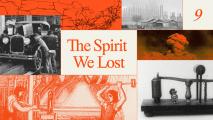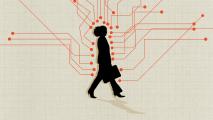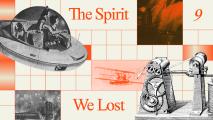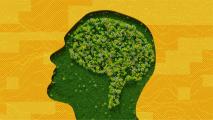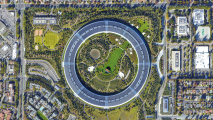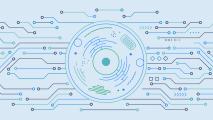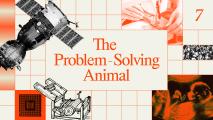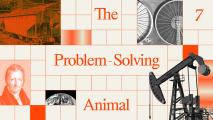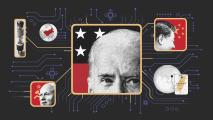Status: Featured
To promote content in various display modules across the site
A memo from the future
In the world of 2069, humans have more reach, more speed, and more leverage than any previous generation.
A playbook for the next century of progress
To build a bold, abundant future, we must reform the laws, institutions, and culture that once powered human progress.
The promise of longevity: A future with more time — and more meaning
An introduction to Freethink's Longevity Issue: features, essays, and op-eds on the science, ethics, and promise of longer, healthier lives.
How technocracy made us doubt progress
The 20th century left us with fatalism, defeatism, and a hollowed-out vision of the future. Techno-humanism can restore our belief in progress.
“War of the Worlds” didn’t panic America. Newspapers did.
Legacy newspapers inflated a handful of complaints into "mass panic" to blunt radio’s rise and defend their influence.
The search for anti-gravity propulsion
Exploring the strange intersection of science, conspiracy, and military secrecy in the decades-long quest for anti-gravity propulsion.
The AI vibe shift: From doom to realism
Existential anxiety surrounding AI is giving way to more realistic concerns about its potential impact on the workforce and beyond.
AI will never be a shortcut to wisdom
Real understanding, argues thought leader Jeff DeGraff, doesn’t come from outputs — it comes from practice.
No, AI won’t take all the jobs. Here’s why.
When you consider the mechanics of integrating AI into the job market, the idea that it will take all our jobs quickly falls apart.
AI doomerism isn’t new. Meet the original alarmist: Norbert Wiener
Decades before Geoffrey Hinton and Eliezer Yudkowsky raised alarms, the computer scientist warned AI could steal jobs and outsmart humans.
We used to celebrate science and innovation
From the Brooklyn Bridge to the polio vaccine, society once honored signs of progress with parades, fireworks, and festivals.
Ancient Olympians wouldn’t qualify for today’s Games
Across history, the human body has been reshaped by discipline, medicine, and now technology — each era redefining peak performance.
A tragedy, a lawsuit, and the birth of an AI moral panic
A lawsuit claiming an AI chatbot caused a teen’s suicide risks sparking a new moral panic, echoing past fears built on distorted evidence.
Why AI gets stuck in infinite loops — but conscious minds don’t
Anil Seth suggests the difference is that living beings are rooted in time and entropy, a grounding that may be essential for consciousness.
We purged worms from our bodies — and may have made ourselves sick
Biotech labs are mining worm chemistry to design medicines that calm the immune system without the risks of live infection.
The Eiffel Tower was considered techno-dystopian
Before completion for the 1889 World’s Fair, the Eiffel Tower project was treated by some as an industrialist "Tower of Babel."
From cryonics to aging: How AI is transforming human health
From curing rare diseases to extending lifespans, four biotech founders share how AI is rewriting the future of medicine.
What if humans mastered every aspect of nature?
A bold vision of a 10x better future where humanity has mastered biology, energy, and matter to unlock unprecedented progress.
Governing AGI: Model laws, chip wars, and sovereign AI
The US must regulate AI in a way that protects society, preserves America’s competitive edge, and fosters innovation — all at the same time.
The forgotten war on the Walkman
Today, the Sony Walkman inspires nostalgia, but in the 1980s, it was feared as a dangerous device that could disconnect society.
If we want artificial “superintelligence,” it may need to feel pain
Philosopher Jonathan Birch argues that sentience might be essential to “higher” forms of intelligence, including truly intelligent AI.
The age of industrialized imagination
By slashing costs, AI will spark a creative renaissance in the entertainment industry, leading to more working artists, not fewer.
World’s first nuclear electricity influencer envisions a “Rad Future”
An excerpt from "Rad Future: The Untold Story of Nuclear Electricity and How It Will Save the World" by Isabelle Boemeke.
America’s next grand mission: Build an AI-powered society for all
America’s new mission isn’t just to invent the new technology of AI. It must invent the systems that then make the most of AI.
AI’s next frontier: Modeling life itself
Biologists are skipping the petri dish and using AI-powered virtual cells to experiment in silico.
Second opinions in the age of ChatGPT
ChatGPT and other AI-powered tools are quietly reshaping how people interpret, challenge, and act on medical advice.
The real danger in “I, Robot” isn’t AI. It’s humans.
“I, Robot” is a convincing allegory in favor of embracing AI innovation rather than over-regulating, centralizing, and stifling it.
The Golden Dome should be built — just not the way Trump imagines
President Trump's headline-grabbing Golden Dome proposal can serve as the spark for a more realistic homeland defense upgrade.
In humanity’s dance with technology, people lead. Always.
As the history of tech demonstrates, we do not have to simply accept and adapt to AI. We can, collectively, choose what to do with it.
Silicon Valley has entered its superstar engineer era
In the race to AGI, tech companies are borrowing playbooks from sports, finance, and film to land elite talent. Here's why.
AI can dramatically expand human agency
If we get AI right, it will accelerate empowerment, enabling people to learn any subject, start any business, and realize any vision.
A personal assistant for everyone: The promise of ambient AI
We're leaving the app era and entering the age of ambient AI: intelligent help that’s always on, but never in the way.
Gen Z: We must resist the temptation to cheat on everything
Adopting the "cheat on everything" mentality — treating thinking as a burden AI can eliminate — is not only wrong, it’s dangerous.
Inside a neuroscientist’s quest to cure coma
Thousands of Americans are trapped in disorders of consciousness. Neuroscientist Daniel Toker is searching for a way out.
Albert Einstein said automation caused the Great Depression. It didn’t.
Einstein blamed automation for the widespread unemployment of the Great Depression, but his reasoning was based on a false premise.
Has AI made “learn to code” obsolete?
Freethink talks to the creator of the world's most popular AI coding assistant to find out whether learning to code is still worthwhile.
Google AI exec: “The mistake would be thinking this is hype.”
Bestselling author and Google Labs' Editorial Director Steven Johnson talks about the future of AI at Freethink's Great Progression event.
A call to innovators in Silicon Valley and beyond to help chart the new way forward
Peter Leyden sums up the key themes and big ideas of his new series at a Freethink Conversation in San Francisco.
Technophobia has a body count
Activists push scary headlines about the harm they predict a technology will cause, but ignore the good things we stand to lose without it.
The AGI economy is coming faster than you think
The impact of AGI on the economy will be big, it’ll happen fast, and it’ll be disruptive. Here's how the disruption could play out.
It’s far too early to call “peak ideas”
Economic growth is driven by ideas, not resources — and as history shows, the well of innovation is unlikely to ever run dry.
The war on artificial ice
Decades before states started banning lab-grown meat, manufactured ice was the "unnatural" alternative under attack.
What if you could start civilization over with AI?
Innovators in every industry and field should adopt the same mantra: If you could start fresh with AI, then what would you do?
How consensus can undermine science
The main objective of consensus statements appears to be to reduce doubt, which may stifle scientific inquiry.
Three founders look to the future at Freethink’s inaugural Great Progression event
The tech community came together for the launch of the Great Progression event series, curated by Peter Leyden and produced by Freethink.
Why AI today is more toddler than Terminator
In "Raising AI," author De Kai argues that AIs are more like society's children than machines under our control.
How proof-of-human tech could save the internet
Sam Altman’s World Network uses iris-scanning Orbs to give people a way to prove that they are people — and not AIs — online.
The AI social network war has begun
A secret prototype, a hardware deal with Jony Ive, and millions of AI images suggest OpenAI is making a play for your social media feed.
Predictions of resource scarcity have a fundamental flaw
From where we stand, the true limits to growth are currently unknowable and need not affect any decisions we make today.
Are large language models dyslexic?
Despite outperforming humans at many tasks, multimodal LLMs struggle to read time on a clock — just like many people with dyslexia.
AI thinks “vegetative electron microscopy” is real — it’s not
The appearance of a nonsense term in multiple scientific papers has exposed how flawed data in training sets can become embedded in AIs.
Pac-Man turned 45 today. The surgeon general once warned that playing it could make kids violent.
Officials' warnings about the impact of video games on kids were never proven true. They may be making the same mistake with social media.
Grand Theft Auto 6’s delay could lead to a spike in real-life crime
If violent video games caused real-world violence, we'd see spikes in crime right after their release. Instead, we see the opposite.
Why Substack will be the intellectual engine of the 21st century
The 21st-century version of the Royal Society could be the Substack network that we are just starting to build out today.
Vibe coding is rewriting the rules of technology
Rather than meticulously crafting each line of code, developers can now “vibe” with AI tools using natural language.
Cheap AI is causing a power shift in the world’s militaries
The militaries that leverage the low-cost capabilities of AI the most will have a decisive advantage in the future.
Media has a blind spot when covering the AI panic
When news outlets quote warnings of an impending AI catastrophe, they rarely mention the two main movements behind this narrative.
Indie developers may save the video game industry from itself
Indie developers continue to push the video game industry forward as big-name publishers focus on safe bets and machine-pressed sequels.
How AI could usher in The New Enlightenment
AI could trigger a civilization-scale change for humanity the same way the steam engine helped usher in The Enlightenment 250 years ago.
The missing tech case for how we create an era of abundance
AI and other new technologies could make things that are costly and scarce today, cheap and abundant for all tomorrow.
This startup is racing to mine the final frontier
AstroForge isn't afraid to take risks if it means being the first to mine asteroids for the rare metals we need for many clean energy technologies.
Why America reinvents itself every 80 years — and is doing so again
Three separate theories help explain why America enters a period of great progress every 80 years — and why another is coming soon.
“Stopping climate change” is the wrong goal
Anything that matters to humans should be under our control. The climate matters—so we should control the climate.
How DeepSeek rewrote the rules of the AI race
Chinese startup DeepSeek has proven that vast quantities of capital and cutting-edge chips aren't prerequisites for world-class AI.
America underestimates the difficulty of bringing manufacturing back
Tariffs won't bring manufacturing back to the US, but there are ways to make it happen — if America is serious about doing so.
Kevin Kelly points a new way forward into the Age of AI
One of the most original and optimistic thinkers in America helps build out some big through lines on what's possible with AI in the next 25 years.
The artifact isn’t the art: Rethinking creativity in the age of AI
ChatGPT's Studio Ghibli imitations invite questions about the creative value of people and what we really mean when we talk about creativity.
America is going through its every-80-year reinvention
Futurist Peter Leyden finds parallels between America in 2025 and at three pivotal points in its history, each 80 years before the last.
A dozen reasons to read Peter Leyden at this critical juncture in history
To truly understand our historic moment, you need a comprehensive, big-picture, long-term perspective that deeply understands artificial intelligence and the next wave of transformative technologies.
What is The Great Progression: 2025 to 2050?
We have a historic opportunity to harness AI and other transformative technologies in order to make a much better world in the next 25 years.
Humanoid helpers are now entering our homes
Robotics startup 1X Technologies is now sending its humanoid robots into homes to help people with chores and provide companionship.
Fire-resilient prefabs are helping LA build back better
Victims of LA's wildfires are opting for tech company Cover's prefab homes over traditional new builds. Here's why.
Progress happens because solutions create new problems to solve
Solutionism means fully accepting what’s in front of us and enthusiastically stepping up to meet the challenge.
Arc Institute’s new AI can read and write the code of life
Training on the DNA of nearly 130,000 species taught Evo 2 how to generate DNA sequences the same way other AIs do text or images.
All PCs will be AI PCs “pretty soon,” says Intel exec
Manufacturers are now equipping their PCs with the hardware needed to run the latest AI applications locally. Here's what that means for you.
We’re able to create new creatures through gene editing. What’s stopping us?
The question isn’t whether we can sculpt new life. The question is what comes next.
Today’s wearables track your body. Tomorrow’s could treat it.
Wearables that treat health issues, track countless biomarkers, and last far longer than today's devices are on the horizon.
How AI is reshaping the legal profession
AI-powered tools may already be giving some lawyers the upper hand in court.
These red-hot “green jobs” could help Gen Z cope with its eco-anxiety
"Green" jobs that help combat the climate crisis are on the rise, according to the World Economic Forum's Future of Jobs 2025 report.
Why nations are looking offshore to decarbonize their grids
Interest and investment in offshore solar, wind, and nuclear power systems is increasing as global efforts to decarbonize ramp up.
Blind optimism is not a cure for blind pessimism
We need to fully acknowledge problems, while vigorously pursuing solutions. Call it “solutionism.”
Sal Khan wants to give every student on Earth a personal AI tutor
Khan Academy's new AI tutor, Khanmigo, has the potential to revolutionize education for students and teachers alike.
The startup using “digital twins” to protect homes from wildfires
Stand Insurance is using computer simulations and "digital twins" to help homeowners make their properties fire resilient.
Pantheon creator Craig Silverstein on uploading our brains to the internet
How the cult hit sci-fi show imagines a “techno-realist” future.
The US needs another 4 million houses. Here’s how it could get them.
Restrictive zoning policies helped create America's housing shortage. Zoning reform could help end it.
How AI is being drafted for a digital cold war
"Technology has always been co-opted for war, but truly intelligent AI, let alone a superintelligence, is a different beast entirely."
T-Minus: Counting down the top 10 space stories of 2024
A look back on the 10 greatest space stories of 2024, from SpaceX's "Mechazilla" to a first-of-its-kind civilian spacewalk.
How cryopreservation could end death as we know it
The technology could one day allow people with terminal illnesses to go into "hibernation" until a cure is found.
Google’s $1 billion bet on Africa’s digital future
Just 37% of sub-Saharan Africans use the internet today, but Google predicts the next 10 years will be the region’s “digital decade.”
How to reclaim meaning in a changing world
What if the barrier to a fulfilled life isn’t technology, it’s culture?
Has the US reached “peak obesity”?
A CDC survey suggests America’s obesity rate may be falling. Is this a turning point in the obesity epidemic? Or just a temporary plateau?
T-Minus: Kessler Syndrome
Experts answer 10 big questions about the nightmare scenario that could send us back to the pre-Space Age.
How Boom is resurrecting supersonic flight
If Boom gets its way, the future of supersonic passenger travel will be quieter, cleaner, and more affordable than its past.
How the Internet Archive’s “Free Digital Library” fell to the “fair use” test
The U.S. Court of Appeals for the 2nd Circuit has found the Internet Archive to be in violation of federal law. Here's why.
Can we automate science? Sam Rodriques is already doing it.
People need to anticipate the revolution that’s coming in how humans and AI will collaborate to create discoveries, argues Sam Rodrigues.
Tracy Chou built a startup to “deep clean” your socials
Tracy Chou's Block Party is helping people enjoy the benefits of social media while staying safe both online and IRL.
Why the USSR and China fell behind the US in the Chip Cold War
The US is currently winning the "chip war" with China, but to stay ahead, experts say it needs to start manufacturing microchips stateside.
Silicon chips are no longer sustainable. Here’s what’s next.
To take our tech to the next level, we need a more energy-efficient semiconductor. Gallium nitride could be it.
Is this the biggest industrial espionage campaign in history?
The cat-and-mouse game between China and the world’s semiconductor companies is already having enormous consequences.
AI is now designing chips for AI
AI-designed microchips have more power, lower cost, and are changing the tech landscape.



